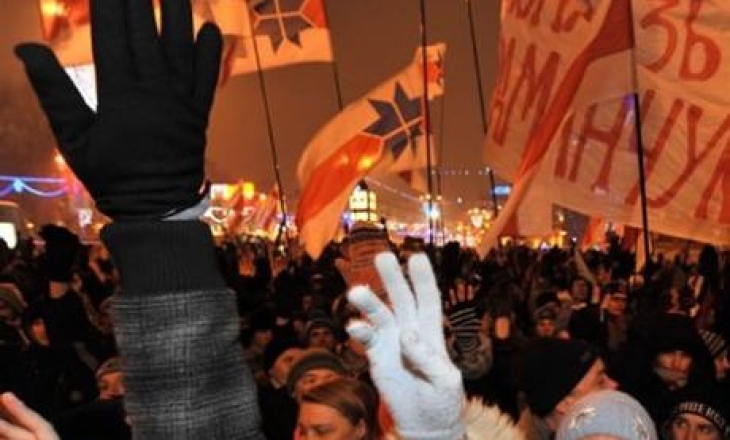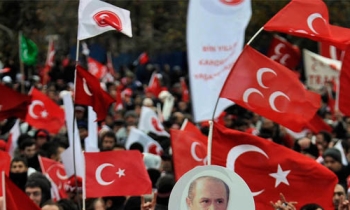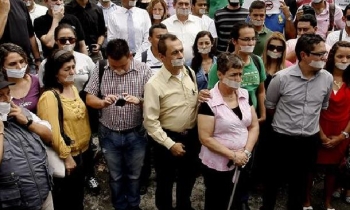Around 20 journalists were arrested and a similar number the victims of police violence during the demonstrations that followed Sunday’s announcement of President Alexander Lukashenko’s reelection victory. The protesters and journalists arrested were being tried Monday. Ilya Kuzniatsu, for example, was sentenced to 15 days in prison on a charge of “participating in an illegal demonstration.”
Paris-based press freedom group Reporters sans Frontières (RSF) voiced its support for the statement released by its partner organization, the Belarusian Association of Journalists (BAJ), condemning the police brutality against journalists. The two organisations also condemned the fact that the police did not distinguish between journalists and protesters, thereby deliberately obstructing the work of the media. Many of the journalists were properly accredited by the local authorities.
“We urge the authorities to publicly condemn the use of violence and to identify and punish those responsible. We finally also deplore the official media’s one-sided coverage of the events of the past few days, which has prevented the public from having an informed view of this key moment in Belarus’ political life,” the two organisations said.
The International Federation of Journalists (IFJ) accused authorities in Belarus of "violent bullying and intimidation" of journalists. "The sheer violence and blatant disregard of journalists' right to cover a public event were shocking," said Aidan White, IFJ General Secretary. "The scenes in Minsk reinforce the image of the intolerant and repressive rule and indicate just how distant Belarus is from the exercise of democracy."
The New York-based Committee to Protect Journalists (CPJ) condemned the violent government crackdown against journalists covering demonstrations in Minsk. "We condemn the systematic repression of reporting on post-election protests and we condemn the arrests of numerous journalists," CPJ Europe and Central Asia Programme Coordinator Nina Ognianova said. "President Aleksandr Lukashenko must not encourage this blatant censorship and anti-media violence. We call for the release of all those arrested immediately. This crackdown must be thoroughly investigated and all those responsible punished to the full extent of the law."
According to the information gathered by BAJ, 20 journalists were arrested Sunday and a similar number were roughed up by police. The victims included foreign reporters (Ukrainian, Russian and German) and local reporters working for both Belarusian and foreign media such as Agence France-Presse and the New York Times.
Several journalists covering the protests in the centre of Minsk were attacked by special forces at about 7 p.m. as they were some 50 metres from opposition candidate Uladzimir Niakliaeu’s headquarters and were heading towards Kastrychnitskaya Square. After throwing flash-bang grenades, the police forced the journalists to lie face-down in the snow. New York Times photographer James Hill was hit when he tried to show his press card. The police also seized equipment and deleted photos and recordings.
Shortly after midnight, Novaya Gazeta reporter Irina Kahlip was hit by police as she was being interviewed live by the independent Moscow-based radio station Ekho Moskvy.
Several BAJ members were arrested along with Niakliayeu supporters during a raid on Niakliayeu’s headquarters. Others (including Aliaksandr Fiaduta, Julia Rymasheuskaya and Sergey Vozniak) were arrested at their homes. Some were released a few hours later but the location of several others, including Vozniak, is currently unknown.
Mobile telephone communications became extremely difficult at around 8 p.m. while many independent and opposition websites were rendered inaccessible as a result of Distributed Denial of Service attacks. Site visitors were also redirected to “counterfeit” pseudo-sites containing false information.
Anyone searching for such leading websites as Charter97.org, Belaruspartisan and Gazetaby, or the site of the newspaper Nasha Niva was directed to a counterfeit site with a similar address but ending in the suffix .in. The very popular blog platform Live Journal did not work very well yesterday either.
Special forces raided the Charter 97 office in the early hours of Monday morning and several of its members were taken to KGB headquarters. Charter 97 editor Natalia Radzina meanwhile sustained a head injury at the hands of the police during a street protest and is reportedly still detained. The website was still inaccessible Monday.
"Belarus will never achieve the status of a democratic state so long as it engages in systematic and violent repression of independent media and free journalism," added White. "Without press freedom there can be no democracy worthy of the name."










